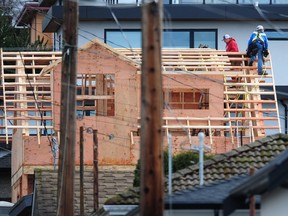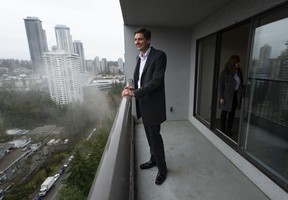Premier David Eby’s refreshed housing plan includes an overhaul in municipal zoning rules along with a crackdown on rule-breaking short-term rental operators

B.C. will overhaul municipal zoning rules to allow so-called “missing middle” housing, such as townhomes and multiplex homes on single family lots, as well as introduce a flipping tax and legalize all secondary suites as part of Premier David Eby’s refreshed housing plan announced on Monday.
“Single family detached homes are out of reach for many middle-class people. And one or two bedroom condos often don’t meet the needs of growing families. Family friendly neighbourhoods need more small-scale, multi-unit homes.”
The debate over missing-middle housing has been divisive in many communities, with proponents calling for creative solutions that will make owning a home more attainable. Opponents, meanwhile, cite parking concerns or fears that higher density will strip the character from neighbourhoods.
Vancouver city council is considering whether to legalize buildings with up to six units on a single-family lot on low-density residential side streets. The City of Victoria in January passed their missing-middle housing policy, which will allow up to six units to be built on a single family lot.
The government will also legalize all secondary suites in B.C., taking the choice away from municipalities. In some B.C. communities, secondary suites are still illegal, a policy which Eby says chokes the supply of affordable rentals.
A pilot program will initially open up the loan program to 3,000 homeowners for the first three years.
British Columbians who buy a home just to flip it for a profit will be hit with a flipping tax that will be introduced later this year. The plan did not include details about the tax but Eby’s housing platform, released before he became premier, called for a tax against those who hold a residential property for two years or less, with the tax rate edging higher the shorter the owner holds the property.
Eby promised to build 6,000 more affordable homes through the Community Housing Fund. Some B.C. mayors have complained that shovel-ready affordable housing projects are languishing because of a lack of funding from B.C. Housing.

In December, Eby admitted that there’s a backlog in government funding for affordable housing with B.C. Housing only approving one out of five applications for new affordable housing from non-profit organizations.
Eby also said the plan will provide more housing for people living on the street, including 3,900 more supportive housing units and 240 more purpose-built complex care housing units for people with severe mental-health and addictions issues.





